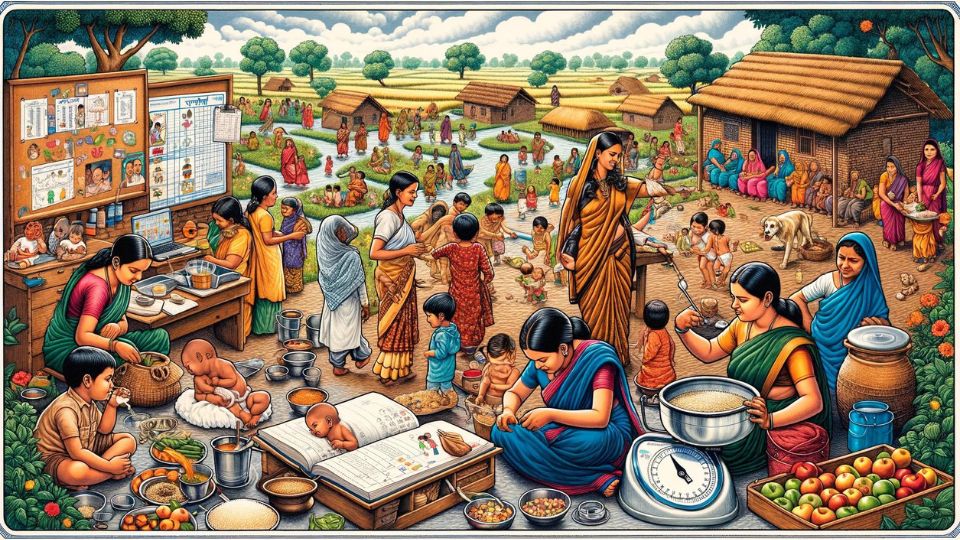What Is the Work of an Anganwadi Worker?
An Anganwadi worker plays a pivotal role in the community's well-being, focusing on maternal and child health, nutrition, and early childhood care. This comprehensive overview sheds light on the responsibilities, significance, and impact of Anganwadi workers in society.

Child Nutrition: Anganwadi workers are responsible for ensuring proper nutrition for pregnant women, nursing mothers, and children below six years of age. They distribute supplementary nutrition, such as take-home rations and hot-cooked meals, to combat malnutrition and promote healthy growth.
Health Check-Ups: Regular health check-ups for children and mothers are a fundamental part of an Anganwadi worker's duties. They monitor growth, detect malnutrition, and provide referrals to health centers when necessary.
Immunization: Anganwadi workers play a vital role in immunization drives by mobilizing families to ensure children receive essential vaccines and vaccinations on time.
Health Education: They conduct awareness sessions on various health and nutrition-related topics, empowering families to make informed choices for their well-being.
Preschool Education: Anganwadi centers often serve as preschools, offering early childhood education to children. Anganwadi workers engage children in age-appropriate learning activities, preparing them for formal schooling.
Pregnancy Care: They provide antenatal and postnatal care to expectant mothers, ensuring a healthy pregnancy and safe delivery.
Community Mobilization: Anganwadi workers actively engage with the community to foster a sense of ownership and participation in health and nutrition programs. They encourage families to access government schemes and services.
Record Keeping: Maintaining accurate records of births, deaths, and health status within the community is a critical part of their responsibilities.
Also Check: Anganwadi Vacancy 2024
Anganwadi Workers: Bridging Gaps and Nurturing Futures
In a country as diverse and populous as India, Anganwadi workers serve as a lifeline for marginalized communities. They bridge gaps in access to healthcare and education, ensuring that every child has a fair chance to thrive. Through their dedication, compassion, and unwavering commitment, Anganwadi workers are nurturing the futures of countless children and mothers across the nation.
As the Anganwadi system evolves and adapts to changing needs, these workers remain the cornerstone of progress, tirelessly striving to uplift the health and well-being of India's most vulnerable populations. Their work embodies the essence of community-driven change and serves as a testament to the power of grassroots initiatives in creating a brighter and healthier future for all.
So, the next time you come across the term "Anganwadi worker," remember the incredible impact they have on the lives of countless families, one child and one mother at a time.
Originally Published by HelloParent.
Understanding the Role of an Anganwadi Worker
An Anganwadi worker, also known as an Anganwadi Sevika, is a frontline community health worker who operates at the grassroots level in India. Their primary objective is to address the critical issues of maternal and child health, early childhood care, and nutrition. Let's delve into the various facets of their role:Child Nutrition: Anganwadi workers are responsible for ensuring proper nutrition for pregnant women, nursing mothers, and children below six years of age. They distribute supplementary nutrition, such as take-home rations and hot-cooked meals, to combat malnutrition and promote healthy growth.
Health Check-Ups: Regular health check-ups for children and mothers are a fundamental part of an Anganwadi worker's duties. They monitor growth, detect malnutrition, and provide referrals to health centers when necessary.
Immunization: Anganwadi workers play a vital role in immunization drives by mobilizing families to ensure children receive essential vaccines and vaccinations on time.
Health Education: They conduct awareness sessions on various health and nutrition-related topics, empowering families to make informed choices for their well-being.
Preschool Education: Anganwadi centers often serve as preschools, offering early childhood education to children. Anganwadi workers engage children in age-appropriate learning activities, preparing them for formal schooling.
Pregnancy Care: They provide antenatal and postnatal care to expectant mothers, ensuring a healthy pregnancy and safe delivery.
Community Mobilization: Anganwadi workers actively engage with the community to foster a sense of ownership and participation in health and nutrition programs. They encourage families to access government schemes and services.
Record Keeping: Maintaining accurate records of births, deaths, and health status within the community is a critical part of their responsibilities.
Also Check: Anganwadi Vacancy 2024
The Significance of Anganwadi Workers
Anganwadi workers are the linchpin of India's Integrated Child Development Services (ICDS) program, which aims to improve maternal and child health and nutrition. Their work significantly contributes to the overall development of children and mothers in rural and urban areas. By providing essential services and promoting health-conscious behaviors, Anganwadi workers are instrumental in reducing child mortality rates, preventing malnutrition, and empowering women in their communities.Anganwadi Workers: Bridging Gaps and Nurturing Futures
In a country as diverse and populous as India, Anganwadi workers serve as a lifeline for marginalized communities. They bridge gaps in access to healthcare and education, ensuring that every child has a fair chance to thrive. Through their dedication, compassion, and unwavering commitment, Anganwadi workers are nurturing the futures of countless children and mothers across the nation.
As the Anganwadi system evolves and adapts to changing needs, these workers remain the cornerstone of progress, tirelessly striving to uplift the health and well-being of India's most vulnerable populations. Their work embodies the essence of community-driven change and serves as a testament to the power of grassroots initiatives in creating a brighter and healthier future for all.
So, the next time you come across the term "Anganwadi worker," remember the incredible impact they have on the lives of countless families, one child and one mother at a time.
Originally Published by HelloParent.

Comments
Post a Comment